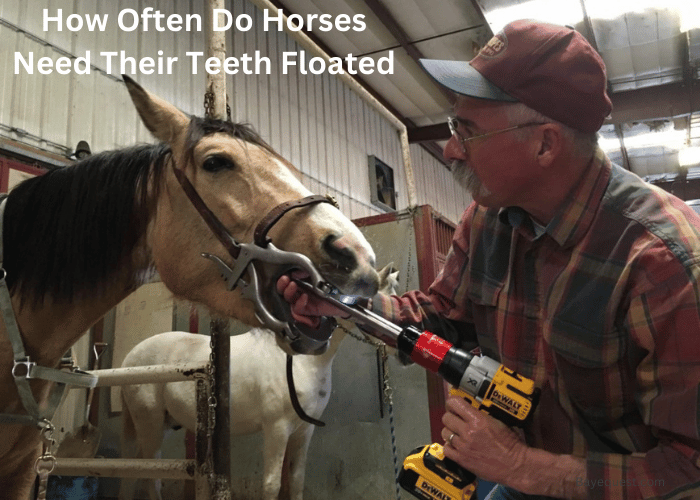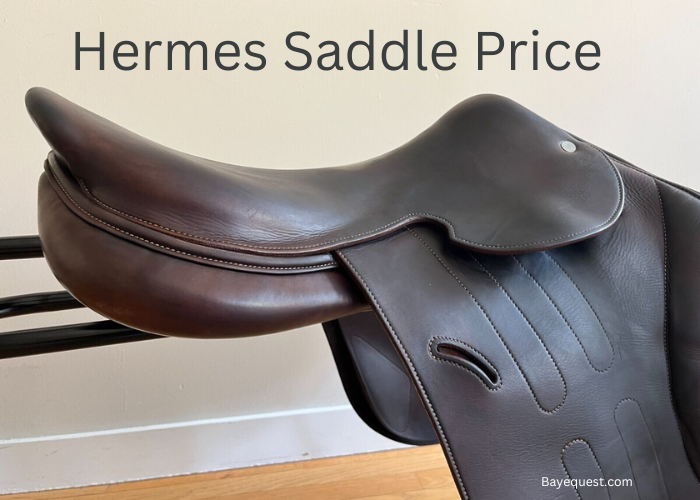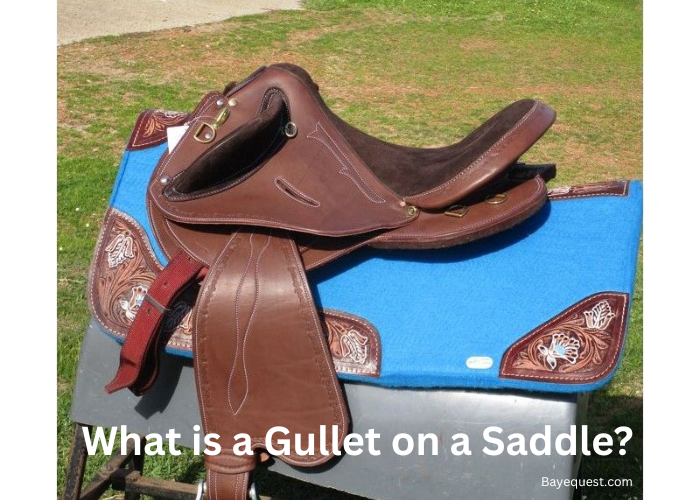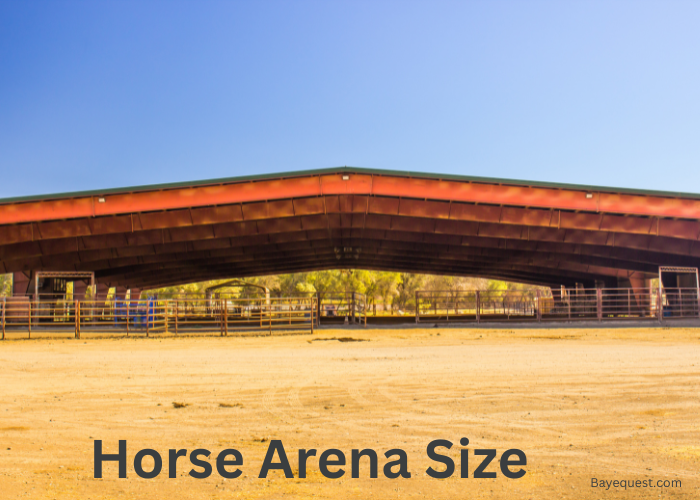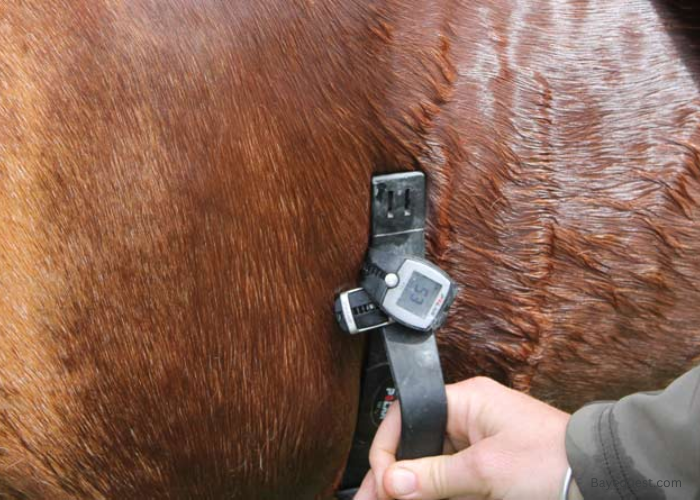A horse’s teeth never stop growing. Over time, uneven wear can create sharp edges that cause discomfort or even pain.
This is where floating comes in. Regular dental care keeps your horse comfortable, healthy, and able to chew properly.
But how often should this be done? The answer isn’t the same for every horse.
Factors like age, diet, and dental history play a big role. In this guide, we’ll explore how often your horse’s teeth need floating and what signs to look for to keep them in top shape.
How Often Do Horses Need Their Teeth Floated? Key Takeaway
Horses need their teeth floated regularly. Young horses should be checked every 6 months. Adult horses need annual floating. Senior horses may require floating every 6 months or more frequently, depending on their dental condition. Regular checks ensure your horse stays comfortable and healthy.
Horse Teeth Anatomy
Horses have 44 teeth. They have incisors at the front, which they use to bite off grass and hay. Behind these are the cheek teeth, including premolars and molars, which grind the food down.
Horse teeth keep growing throughout their lives. This is why they need regular maintenance.
As they chew, they wear down their teeth, but not always evenly. Sharp edges and uneven surfaces can form, making eating uncomfortable.
Read also: What are Wolf Teeth in Horses?
What is Teeth Floating in Horses?
Floating a horse’s teeth is a dental procedure. It involves filing down the sharp points and uneven surfaces on a horse’s teeth.
This process helps prevent discomfort while eating. Over time, a horse’s teeth can develop sharp edges from natural chewing.
These sharp edges can cause pain, ulcers, and eating difficulties.
During floating, a vet or equine dentist uses a special tool, like a rasp, to smooth these areas. This keeps the teeth even and helps the horse chew better.
Regular floating is essential for a horse’s overall health and comfort.
Importance of Getting Your Horse Teeth Floated
Floating a horse’s teeth is crucial for their well-being. Here’s why:
First, it prevents pain. Sharp edges on teeth can cut the inside of a horse’s mouth, making eating painful. By smoothing these edges, floating reduces discomfort.
Second, it improves eating. When teeth are uneven, horses can struggle to chew their food properly.
This can lead to weight loss and poor nutrition. Floating helps them grind food efficiently, ensuring they get the nutrients they need.
Third, it prevents serious dental issues. Untreated dental problems can lead to infections, abscesses, and other complications. Regular floating keeps these issues at bay, promoting better overall health.
In short, floating a horse’s teeth is essential for their comfort, nutrition, and health. Regular dental care ensures your horse stays happy and healthy.
When to Have Your Horse’s Teeth Floated
Knowing when to have your horse’s teeth floated is key.
Watch for eating problems. If your horse is dropping food, chewing slowly, or showing discomfort while eating, it might be time for a dental check-up.
Pay attention to weight. Sudden weight loss can signal dental issues. If your horse isn’t maintaining a healthy weight despite a good diet, it could be a sign they need their teeth floated.
Check for behavioral changes. Horses with dental pain might become irritable, toss their heads, or avoid the bit when riding. These changes can indicate they need dental care.
Follow a routine. Young horses (under 5 years) should be checked every 6 months, as their teeth are developing rapidly.
Adult horses typically need an annual check-up, while senior horses (over 20 years) may need more frequent visits.
In short, stay observant and schedule regular dental exams to keep your horse healthy and comfortable.
Horse Teeth Filing Schedule by Age
| Age group | Frequency of Dental Check-Up |
| Young Horses (Under 5 years) | Every 6 months |
| Adult Horses (5-20 years) | Annually (Once a year) |
| Senior Horses (Over 20 years) | Every 6 months or as needed |
11 Signs Your Horse Needs Their Teeth Floated
If you notice any of the following signs, it’s time to check your horse’s teeth.
1. Dropping food: Your horse struggles to keep food in its mouth.
2. Difficulty chewing: Noticeable effort or slow chewing while eating.
3. Weight loss: Unexpected weight loss despite a good diet.
4. Bad breath: Unusually foul-smelling breath.
5. Head tossing: Frequent head tossing, especially when being ridden.
6. Drooling: Excessive drooling or saliva.
7. Chewing on one side: Preferring to chew on one side of the mouth.
8. Facial swelling: Swelling around the jaw or face.
9. Behavioral changes: Increased irritability or reluctance to be bridled.
10. Mouth sores: Visible sores or ulcers inside the mouth.
11. Uneven wear: Noticeable uneven wear on the teeth.
Factors that Affect the Frequency of Teeth Floating
Understanding the factors that affect how often your horse’s teeth need floating is crucial for their health and comfort. The factors are:
Age. Younger horses and seniors need their teeth floated more often. Young horses’ teeth are growing and changing, while seniors’ teeth wear unevenly.
Diet. What a horse eats matters. Horses that eat hay and grass might need less floating. Grain and processed feed can cause uneven wear and sharp edges.
Breed and genetics. Some breeds have dental issues due to genetics. This can mean more frequent floating. Know your horse’s breed and its common dental problems.
Health history. A horse with past dental issues may need more regular care. If your horse has had teeth problems before, keep an eye on them.
Eating habits. How a horse chews affects its teeth. Fast eaters or those with odd chewing patterns might need more frequent floating.
Workload and activity. Horses that work hard or compete often can develop dental issues quicker. Regular check-ups can help keep them performing well.
Environment. Where your horse lives plays a role. Horses in sandy areas might wear their teeth down faster, needing more frequent care.
Overall health. A healthy horse with good overall care may need less frequent floating. Poor health can exacerbate dental issues.
Previous dental care. If your horse has had regular dental care from the start, they might need less frequent floating. Neglect can lead to more issues.
Behavioral changes. Changes in behavior can signal dental problems. An irritable or uncomfortable horse might need their teeth checked.
Professional advice. Always consult your vet or an equine dentist. They can give personalized advice based on your horse’s specific needs.
How to Float a Horse’s Teeth
Here’s how floating a horse’s teeth is done:
Assessing the horse
A veterinarian or equine dentist will first perform an oral examination using a speculum to hold the horse’s mouth open.
They check for sharp points, hooks, or uneven wear on the teeth that may cause discomfort or difficulty chewing.
Sedation (If needed)
Most horses are sedated to keep them calm and relaxed during the procedure. This ensures safety for both the horse and the professional performing the floating.
Using floating tools
Specialized tools, such as manual rasps or powered dental floats, are used to file down sharp edges on the molars and premolars.
The goal is to create a smooth, even chewing surface without over-filing the teeth.
Focusing on problem areas
Hooks, ramps, or other abnormalities are addressed carefully. Attention is given to ensure the horse’s bite remains functional and balanced.
Final inspection
After the floating is complete, the vet or dentist will recheck the teeth to ensure no sharp edges remain and that the horse’s teeth align properly.
Post-floating care
The horse is monitored as the sedation wears off and should have access to water and soft food.
Follow-up care includes observing for any signs of discomfort or chewing issues.
Benefits of Regular Dental Care for Your Horse
Regular dental care for your horse offers many benefits.
It helps prevent pain. Sharp edges on teeth can cause sores and make eating hard.
By smoothing these edges, your horse can eat without discomfort.
Good dental care improves digestion. When a horse chews properly, they break down food better, leading to better nutrient absorption. This keeps them healthier and stronger.
Regular check-ups can catch problems early. Issues like infections or abscesses can be treated before they become serious. This means fewer emergencies and lower vet bills.
Proper dental care also enhances performance. A comfortable horse is happier and performs better, whether in work or play.
In short, regular dental care keeps your horse healthy, happy, and performing at their best.
Risks of Neglecting Dental Care for Your Horse
Neglecting dental care for your horse comes with several risks. Here’s why it’s important to stay on top of it:
First, it causes pain. Sharp edges and uneven teeth can cut the inside of the mouth, leading to sores and ulcers. This makes eating a painful experience for your horse.
Second, it affects nutrition. If your horse can’t chew properly, they won’t get the nutrients they need from their food. This can lead to weight loss and poor overall health.
Third, it leads to serious dental problems. Neglected teeth can develop infections, abscesses, and other complications. These issues can be painful and expensive to treat.
Fourth, it impacts behavior. A horse in pain from dental issues may become irritable, resistant to the bit, or unwilling to perform.
In short, neglecting dental care can cause pain, poor nutrition, serious dental problems, and behavior issues.
Regular dental check-ups are essential to keep your horse healthy and happy.
Why Do Horses Need Their Teeth Floated? Conclusion
Keeping your horse’s teeth in check is key to their happiness. Regular floating prevents pain, improves eating, and keeps them performing their best.
Don’t wait for problems to show up. Watch for signs and follow a routine based on their age and needs.
A happy horse makes for a happy rider. So, saddle up and make dental care a priority. Your horse will thank you with every smooth ride and joyful neigh.
Keep those pearly whites in tip-top shape, and you’ll both enjoy the ride.
Also, check out some of the best senior horse feeds that we have outlined in our guide.




